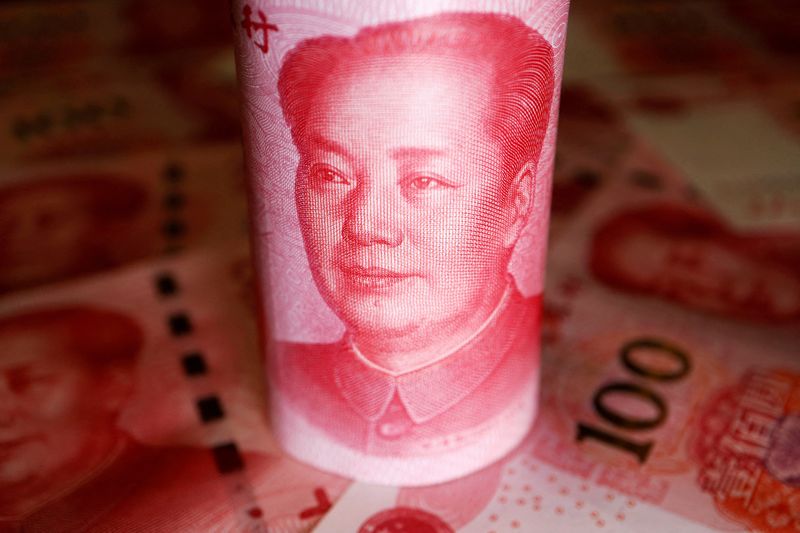BEIJING (Reuters) -China will set up a new financial regulatory body consolidating oversight, which analysts said was aimed at closing loopholes with multiple agencies monitoring different aspects of trillions of dollars' worth of its financial services industry.
The government will also set up a bureau responsible for coordinating the sharing and development of data resources, according to a plan submitted to parliament on Tuesday.
The new financial regulator will replace the China Banking and Insurance Regulatory Commission (CBIRC) and bring supervision of the industry, excluding the securities sector, into a body directly under the State Council, or cabinet.
The proposal for setting up the new regulator, the National Financial Regulatory Administration, was presented to China's parliament during its annual meeting on Tuesday.
China's financial sector is overseen by the People's Bank of China (PBOC), the CBIRC, and the China Securities Regulatory Commission (CSRC), with the cabinet's Financial Stability and Development Committee having overall responsibility.
Under the new plan, the CBIRC's responsibilities would move to the new administration along with certain functions of the central bank PBOC and securities regulator CSRC.
The setting up of the new financial regulatory body comes as Beijing seeks to rein in large corporate and financial institutions that may bring systemic risks via regulatory arbitrage among multiple authorities.
In the last couple of years, a string of private enterprises in China, including fintech giant Ant Group, have come under scrutiny of multiple watchdogs after years of laissez-faire regulatory approach.
Citigroup (NYSE:C) said in a research note regulatory loopholes under "multiple regulators" could be bridged with the establishment of the new body. Financial regulation overlap especially at the local level should be reduced as well, it said.
The regulatory shake-up also comes after President Xi Jinping, who clinched a precedent-breaking third leadership term in October, last week renewed his call for ambitious reforms of Communist Party and state institutions.
The National People's Congress (NPC), which closes on Monday, is also set to confirm a slate of new leaders including Li Qiang, who is set to be the next premier, in what is expected to be the biggest government reshuffle in a decade.
As part of the wider government revamp announced on Tuesday, staff numbers at central-level state institutions will be cut by 5%.
"You could certainly argue for better coordination between regulators but a whole new super regulatory administration may not be the solution," said Fraser Howie, author of several books on China's financial system.
"But centralisation of power appeals to many in China."
The legislature will vote on the institutional reform plan on Friday.
'STRENGTHEN SUPERVISION'
The new administration will "strengthen institutional supervision, supervision of behaviours and supervision of functions", according to the plan. Supervision will be "penetrating" and "continuous", the proposed plan said.
Under the existing set-up, the CBIRC combined the equivalent functions of the Office of the Comptroller of the Currency (OCC) and the Federal Deposit Insurance Corp (FDIC) in the United States, with some regulatory role held by the central bank, said Li Nan, professor of finance at Shanghai Jiaotong University.
"Now all of those regulatory functions are with the new bureau, which is basically CBIRC with some regulatory role taken back from PBOC and CSRC, which makes perfect sense," she said.
"And the PBOC will become more focused on monetary policy afterwards, which resembles what the Fed does," she said.
Under the plan, the PBOC's nine regional branches will be abolished, replaced by 36 branches across the country, reversing a reform that was implemented in 1998 that had mirrored the U.S. Federal Reserve system.
Separately, sources have said China may revive the Central Financial Work Commission (CFWC), a high-level financial sector oversight body directly under Communist Party leadership, a decision on which may be revealed after the parliamentary session.
DATA REGULATOR
The proposed data bureau will be run by the powerful state planner, the National Development and Reform Commission (NDRC), and absorb some of the functions of the Office of the Central Cyberspace Affairs Commission, which oversees China's internet.
The new bureau's functions will include the exchange of information resources across industries and promoting smart cities.

China has in recent years strengthened oversight over data, concerned that unchecked collection by private firms could allow rival state actors to weaponise information on infrastructure and other national interests, and the belief that data has become a strategic economic resource.
Beijing will also restructure its science and technology ministry to concentrate resources on achieving breakthroughs, amid U.S. efforts to block Chinese access to key technology. It will also form a Central Commission on Science and Technology, increasing Communist Party control in the field.